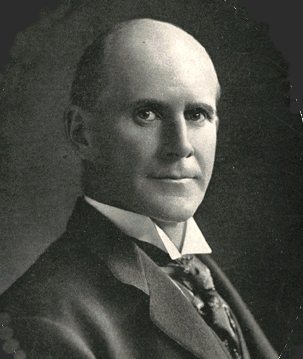mowa wygłoszona na procesie przed Sądem Najwyższym w 1919, kiedy Debs został uznany winnym naruszenia Ustawy o szpiegostwie, bowiem wśród jego słuchaczy byli młodzi ludzie w wieku poborowym, a więc jego przemówienie mogło „utrudniać rekrutację lub werbunek do armii”.
Źródło: Howard Zinn, Ludowa historia Stanów Zjednoczonych. Od roku 1492 do dziś, tłum. Andrzej Wojtasik, Wyd. Krytyki Politycznej, Warszawa 2016, s. 475.
Eugene Debs słynne cytaty
w 1904.
Źródło: Howard Zinn, Ludowa historia Stanów Zjednoczonych. Od roku 1492 do dziś, tłum. Andrzej Wojtasik, Wyd. Krytyki Politycznej, Warszawa 2016, s. 440.
mowa wygłoszona na procesie przed Sądem Najwyższym w 1918, Debs został aresztowany za naruszenie Ustawy o szpiegostwie, bowiem wśród jego słuchaczy byli młodzi ludzie w wieku poborowym, a więc jego przemówienie mogło „utrudniać rekrutację lub werbunek do armii”.
Źródło: Howard Zinn, Ludowa historia Stanów Zjednoczonych. Od roku 1492 do dziś, tłum. Andrzej Wojtasik, Wyd. Krytyki Politycznej, Warszawa 2016, s. 474.
o krwawym stłumieniu strajku kolejarzy w 1894 w Chicago, podczas którego policja i wojsko zabiły 34 robotników.
Źródło: Howard Zinn, Ludowa historia Stanów Zjednoczonych. Od roku 1492 do dziś, tłum. Andrzej Wojtasik, Wyd. Krytyki Politycznej, Warszawa 2016, s. 369.
Źródło: Howard Zinn, Ludowa historia Stanów Zjednoczonych. Od roku 1492 do dziś, tłum. Andrzej Wojtasik, Wyd. Krytyki Politycznej, Warszawa 2016, s. 369.
po wydarzeniach w Homestead, Coeur d’Alene i strajku w Buffalo.
Źródło: Howard Zinn, Ludowa historia Stanów Zjednoczonych. Od roku 1492 do dziś, tłum. Andrzej Wojtasik, Wyd. Krytyki Politycznej, Warszawa 2016, s. 366.
o powołaniu Amerykańskiego Związku Kolejarzy (American Railway Union).
Źródło: Howard Zinn, Ludowa historia Stanów Zjednoczonych. Od roku 1492 do dziś, tłum. Andrzej Wojtasik, Wyd. Krytyki Politycznej, Warszawa 2016, s. 366.
na procesie przed Sądem Najwyższym w 1918, odpierając zarzuty, że socjaliści są zwolennikami Niemców.
Źródło: Howard Zinn, Ludowa historia Stanów Zjednoczonych. Od roku 1492 do dziś, tłum. Andrzej Wojtasik, Wyd. Krytyki Politycznej, Warszawa 2016, s. 474.
Eugene Debs: Cytaty po angielsku
The Canton, Ohio Speech, Anti-War Speech (1918)
The Socialist Party and the Working Class (1904)
The Canton, Ohio Speech, Anti-War Speech (1918)
Jesus, the Supreme Leader (1914)
The Canton, Ohio Speech, Anti-War Speech (1918)
The Secret of Efficient Expression (1911)
Sound Socialist Tactics (1912)
The Negro and His Nemesis (1904)
The Socialist Party and the Working Class (1904)
The Socialist Party and the Working Class (1904)
Outlook for Socialism in the United States (1900)
Two Letters on Party Policy (1910)
"Industrial Unionism" (1905), Eugene Debs Speaks
"Industrial Unionism" (1905), Eugene Debs Speaks
"Industrial Unionism" (1905), Eugene Debs Speaks
